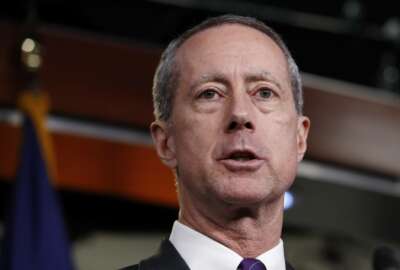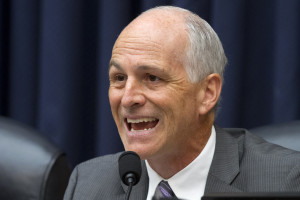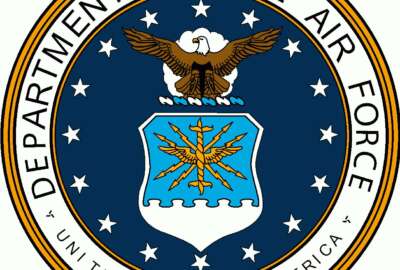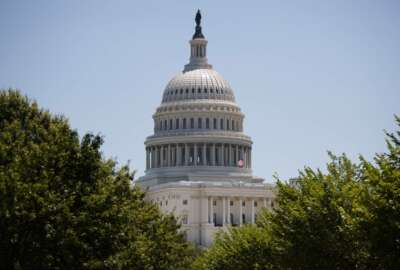
Democratic control of House could mean more ‘rational’ defense budget
House Armed Services Committee Ranking Member Adam Smith says if Democrats take the House they will prioritize the budget.
Best listening experience is on Chrome, Firefox or Safari. Subscribe to Federal Drive’s daily audio interviews on Apple Podcasts or PodcastOne.
As the 2018 congressional election heats up, the possibility of a change in chairmanship for the House Armed Services Committee is very much in play.

A switch in gavel ownership could spell different priorities in upcoming defense authorization bills than in the past. If Democrats take the House, the most likely chairman is Rep. Adam Smith (D-Wash.), the current ranking member.
Smith enumerated a handful of differences between him and his Republican counterparts, who have held the House since 2010, including funding for large weapons systems and defense spending in general.
Speaking Wednesday at the Defense News Conference in Arlington, Va., Smith said he thinks available defense spending will be lower than more conservative-minded lawmakers expect in the coming years.
An expert or military official testifies at hearings and “scares the hell out of us by saying there’s this huge massive threat … We are hopelessly outgunned, outmanned, everything is falling apart we’re all going to die, basically,” Smith said. “All part of an effort to get us to spend a massive amount of money on any one of a thousand different things.”
Smith said Democrats will look at how they can, within a reasonable budget, manage risk while also prioritizing other factors that make a country “safe, secure and prosperous” like paying down debt and fixing infrastructure.
“The biggest problem I feel that we’ve had is, because we get this ‘Oh my God we have to cover everything [mindset],’ we wind up covering nothing well and that leaves the men and women who serve us in a position where they are not properly trained, properly equipped to meet all the missions we want them to meet,” he said. “It’s a complete impossibility to meet all the missions that we dream up.”
Smith says current DoD budget too high
The ranking member said this year’s $716 billion authorized budget for 2019, with emergency war funding included, is too high and it’s “certainly not going to be there in the future” considering the United States’ deficit is rising.
However, Smith’s remarks come as Air Force Secretary Heather Wilson said at the same conference that her service used extra money from Congress in 2017 and 2018 to rebuild its force by reducing its maintainer deficit, helping fill holes in squadrons and investing in precision munitions.
While the military has needs and is filling in readiness gaps, Smith said the country needs to stop overreaching. He mentioned how the U.S. was dominant in the mid-20th century, but that was also because the country fought an away-game war while the rest of its main competitors had to recover from the effects of the World War II on their turf.
“That was awesome, we dominated for a long period of time,” Smith said. “But it’s gone. We are going to be a major, major player. Probably the major player on the global stage for a long time to come … but we are not going to be utterly and completely dominant.”
Smith said with adversaries spending money and catching up, companies will move toward those countries as well as the U.S. for investment in state-of-the-art technologies.
“The question is do we cling to this notion of dominance and say ‘Gosh, we have to spend $2 trillion on our defense budget to be as dominant as we were in the fifties and sixties? I think that would be a mistake,” Smith said. “The proper approach is to say, ‘OK we are a major player, what are our interests?’ Part of the key of this is we need to build partnerships, we don’t need to dominate, we are going to need to work with other people.”
Latest Defense News
One of Congress’ constitutional duties is to oversee the other branches and Smith feels like the House Armed Services Committee failed in doing that.
“There is a real role here for Congress to step in where the White House has stepped back,” Smith said referring to his perception of the White House giving the Pentagon more power to make war decisions. We need to “make sure the military is not engaged in places or in ways that are not in our best interest and are not transparent,” he said.
Of course no conversation is ever complete without talk of the space force. Smith said he supports a space force, but as an entity similar to the Marine Corps; a service within the Department of the Air Force.
Copyright © 2025 Federal News Network. All rights reserved. This website is not intended for users located within the European Economic Area.
Scott Maucione is a defense reporter for Federal News Network and reports on human capital, workforce and the Defense Department at-large.
Follow @smaucioneWFED





